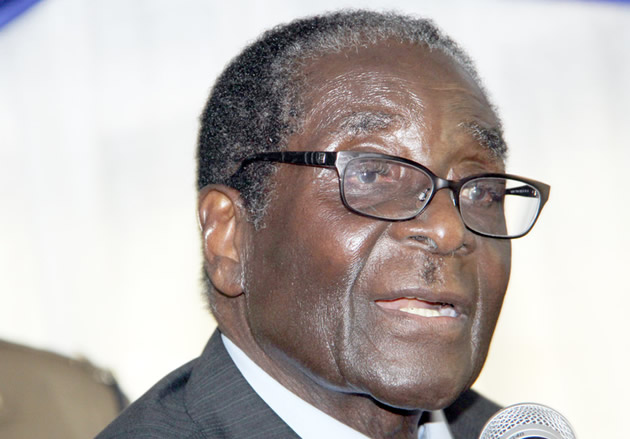President’s diplomacy redraws geopolitical map

Dr Itayi Garande Correspondent
While African leaders who attended the US-Africa Leaders Summit were welcomed as a group of 50 African heads of state and given quick photo opportunities at the White House, President Mugabe was received with full military honours at the Great Hall of the People fronting Tiananmen Square in the heart of Beijing.
PRESIDENT Mugabe has outwitted Western leaders and scored many diplomatic successes, most of which have gone unnoticed, yet those successes are redrawing the geopolitical map and shifting the balance of power.
There seems to be no number of potentially history-changing crises that President Mugabe cannot attack at once.
He remains the only African leader who can defy the “commissars of political correctness” by commenting on crises everywhere, while others focus only on domestic issues, failing to make serious geopolitical connections between domestic and international events.
He seems completely unburdened by previous decades of failure to achieve diplomatic solutions to pressing global and African crises, and if he doubts his own eventual success, it does not show.
Political courage is shown by those who risk their own careers and lives, or have the statesmanship to resist the temptations of lazy demotic.
The President seems to approach the combustible situations unfolding across the globe and at home with a cool head.
Because so much is at stake in Africa and elsewhere in the world, one cannot stop admiring the cool-headed, thoughtful, yet unwavering direction he offers.
He may not know it all, but he’s a thinker, a statesman, not some trigger-happy soldier.
While other African leaders politely reserve judgment over Western culpability on Libya, Iraq, Gaza and other places and “claim to be defenders of democracy”, President Mugabe has remained vocal and resolute.
He has become the lone voice bold enough to speak for the African continent: “These are the same nations which impose sanctions on Zimbabwe and seek to subjugate the African continent.”
No one is more befitting to lead the Southern Africa Development Community (Sadc) and the African Union (AU) than President Mugabe at this juncture.
In case anyone cares to notice, the world may be falling apart with lack of international leadership, but President Mugabe is busy putting together a string of surprising diplomatic victories.
The extension of the negotiating window and suspension of sanctions by the European Union (EU) came and went with little notice.
Notwithstanding all their bluster, there are signs that the EU is now looking for a way out of the Zimbabwe sanctions issue.
While the commentariat jury is out on how to assess progress so far, there is no denying that the EU and Britain in particular are playing ball when it comes to Zimbabwe, especially on the backdrop of an embarrassing sanctions lawsuit.
President Mugabe’s proactive diplomacy, using every available platform to denounce sanctions, has brought us a step forward in the budding rapprochement between Zimbabwe and the EU.
Another diplomatic success that the international community shares a vague awareness of is how President Mugabe has corralled the AU and Sadc into opposing the illegal and ruinous sanctions on Zimbabwe.
Also, while the main spotlight has been on the EU and Africa, a very significant sideshow has been taking place in relation to China.
President Mugabe is currently on a five-day State visit to China, after an invitation by his Chinese counterpart Xi Jinping.
While African leaders who attended the US-Africa Leaders Summit were welcomed as a group of 50 African heads of states and given quick photo opportunities at the White House, President Mugabe was received with full military honours at the Great Hall of the People fronting Tiananmen Square in the heart of Beijing.
The President’s visit is symbolic in many ways and marks yet another diplomatic victory.
It comes as Zimbabwe, while coming in from the cold, has assumed the chairmanship of Sadc and prepares for chairmanship of the AU.
President Xi has made a very strong diplomatic calculation by inviting President Mugabe to Beijing, not only as he has won a decisive victory against the opposition MDC in Zimbabwe, but also as he has assumed the roles of Sadc chair and future AU chair.
This put relations between China and Zimbabwe, on one hand, and the African region and China, on the other, at the fore of regional and international politics – overshadowing the Obama summit.
Details of agreements between China and Zimbabwe may make less interesting copy than the international talks with the stars of the global political circuit, but a look at them highlights some serious diplomatic successes by President Mugabe and President Xi.
The Chinese are well known for their diplomatic formalities, but remarks by President Xi were unusually effusive.
He said: “Your Excellency (President Mugabe) is a renowned leader of the African national liberation movement. The traditional friendship between China and Zimbabwe was forged in the glorious years when we stood shoulder to shoulder against imperialism, colonialism and hegemony.
“The Chinese people value friendship and we will never forget those good friends and good brothers who have shown mutual understanding and support vis-a-vis China and who have come through thick and thin with us.”
President Xi’s remarks were different from President Obama’s statement in which claimed that the US is interested in restoring peace and democracy and driving development on the African continent.
The Chinese reaffirm the unfinished project of African decolonisation and liberation, in sync with policies like Zimbabwe’s economic empowerment and indigenisation and Black Economic Empowerment in South Africa.
The US cannot talk authoritatively of decolonisation and liberation. It has an appalling nation-building record and Obama’s statement rings hollow when one considers the situation in Egypt, Libya, Syria, Iraq and Gaza and the aspirations of the African people.
President Mugabe, in contrast, is exercising a lot of political influence internationally through his diplomatic relations with China, helping transform global geopolitics.
For China, whose economy is growing in importance, engaging Zimbabwe as it takes over the chairmanship of Sadc and of the AU, is a pragmatic move.
President Xi reaffirmed the 60th anniversary of the Five Principles of Peaceful Coexistence: sovereign equality, friendship, non-intervention, mutually beneficial development, and co-operation.
The China visit has thus catapulted President Mugabe to an African saviour who continues to withstand colonialism and all its manifestations and has effectively solidified his image as a bulwark against Western exploitation.
This has made Chinese support for Zimbabwe’s foreign policy and African development synonymous with rejection of Western exploitation.
President Mugabe and President Xi have thus outwitted Obama by using Sadc and AU structures to exercise their global diplomacy.
President Mugabe currently leads Sadc and will soon lead the AU. He will use them to further his proactive diplomacy and continue the unfinished project of African decolonisation and economic empowerment.
His legacy as a strong, decisive and unflappable pan-African leader will be sealed.
Comments and suggestions to [email protected]










Comments